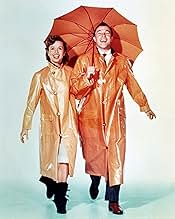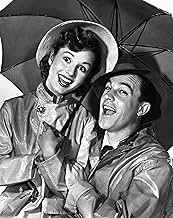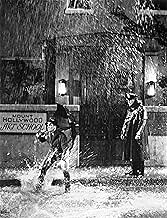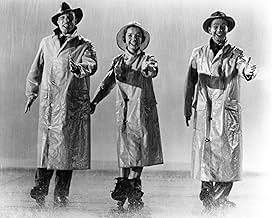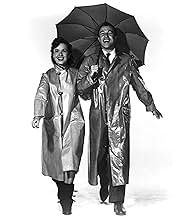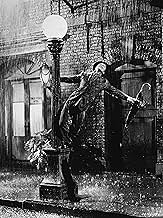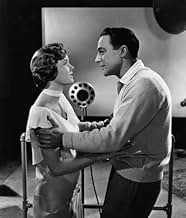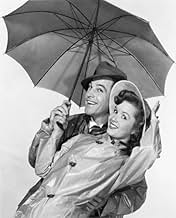Eine Stummfilmproduktionsfirma und deren Schauspieler versuchen, den schwierigen Übergang in die Tonfilmära zu schaffen.Eine Stummfilmproduktionsfirma und deren Schauspieler versuchen, den schwierigen Übergang in die Tonfilmära zu schaffen.Eine Stummfilmproduktionsfirma und deren Schauspieler versuchen, den schwierigen Übergang in die Tonfilmära zu schaffen.
- Für 2 Oscars nominiert
- 8 Gewinne & 9 Nominierungen insgesamt
Dawn Addams
- Teresa - a Lady-in-Waiting
- (Nicht genannt)
John Albright
- Call Boy
- (Nicht genannt)
Shirlee Allard
- Chorus Girl
- (Nicht genannt)
Bebe Allen
- Chorus Girl
- (Nicht genannt)
Sue Allen
- Chorus Girl
- (Nicht genannt)
John Angelo
- Dancer
- (Nicht genannt)
Marie Ardell
- Chorus Girl
- (Nicht genannt)
Bette Arlen
- 'Miss January' in 'Beautiful Girl' segment
- (Nicht genannt)
David Bair
- Chorus Boy
- (Nicht genannt)
Jane Bateman
- Chorus Girl
- (Nicht genannt)
Handlung
WUSSTEST DU SCHON:
- WissenswertesFor the "Make 'em Laugh" number, Donald O'Connor revived a trick he had done as a young dancer: running up a wall and completing a somersault. The number was so physically taxing that O'Connor ended up in a hospital bed for a week after its completion. He suffered from exhaustion and carpet burns. After an accident ruined all of the initial footage, O'Connor agreed to do the difficult number all over again.
- PatzerDuring the Cyd Charisse nightclub dance number, when she's wrapped around Gene Kelly, her body completely changes position between frames due to a clumsy edit. According to commentary on the special edition DVD, this cut of only a few frames' duration dates back to the original release of the film and no one knows why it exists.
- Zitate
Cosmo Brown: Lina. She can't act, she can't sing, she can't dance. A triple threat.
- VerbindungenEdited from Die drei Musketiere (1948)
- SoundtracksFit as a Fiddle
(1932)
Music by Al Hoffman (uncredited) and Al Goodhart (uncredited)
Lyrics by Arthur Freed
Originally from the 1932 stage revue "George White's Music Hall Varieties"
Sung by Gene Kelly (uncredited) and Donald O'Connor (uncredited)
Ausgewählte Rezension
Singin In the Rain is arguably the best movie musical of all time, not just because of the music but because of the entire package - the premise, the comedy, the characters - everything here works together to make you feel better any time you sit down to watch it. It's ironic that this movie was thrown together quickly to capitalize on the success of "An American in Paris", since the improvisational feeling of the movie is one of the things that makes it so much fun. Although this film is number ten on the top 100 films of all time as compiled by the American Film Institute, it wasn't nominated for best picture the year of its release, 1952. Although it did well at the box office, it would be over twenty years before people would look back and realize just what a great motion picture it was. Perhaps that was because the 1970's were such bleak and cynical years, with movies that largely matched that mood, that people were eager to rediscover the fun that a motion picture viewing experience could be.
The movie focuses on that period of time in which the entire motion picture film industry was in nervous transition from silent to talking pictures. Although the movie compresses time in this respect - the transition actually took about three years - it does accurately describe the technical problems of that era along with their comical aspects. There was an overabundance of musicals in the first batch of talking films, many stars did have heavy accents that made their speech undecipherable or voices that came across like nails on a chalkboard like Lina Lamont (Jean Hagen) and saw their careers ruined, and early sound technology itself was so fragile that you would often see actors speaking to potted plants or to coat racks with comic effect. The preview of silent picture team Lockwood and Lamont's first talkie, "The Dueling Cavalier", is one of the most hilarious scenes in the film. It is pretty typical of what you would see in such an early talking picture - dialogue going in and out of sync, actors and actresses strutting around and wildly gesturing as if nobody can hear them, and dialogue that still resembled what you would read off of the title cards in a silent film - "I love you, I love you, I love you".
All of this is one of the reasons Singin' In The Rain will never get dated - it is a comic nostalgic look at a very narrow period in time. This movie is fun outside of its comic take on movie history, though. For one, it's hard to say who steals the show the most, since there are so many thieves involved. Most notably there is Jean Hagen - who actually has a very pleasant speaking voice - as the evil silent star who can't accept her days are numbered. Then there is a 27 year-old Donald O'Connor as Cosmo, the studio music director and sidekick of Gene Kelly's character whose youthful exuberance really shines in the number "Make 'Em Laugh" along with all of his goofy facial expressions. He seems to be having as much fun as the audience. Finally, there are all of the great dance numbers and music, capped by probably one of the most famous scenes of all time - Gene Kelly's rendition of the title number that perfectly captures the joy of a man who has just fallen in love and feels he has the world at his feet. You just can't watch this film and not come away with a smile on your face. It is as good for the soul as chicken soup, just a lot more fun.
The movie focuses on that period of time in which the entire motion picture film industry was in nervous transition from silent to talking pictures. Although the movie compresses time in this respect - the transition actually took about three years - it does accurately describe the technical problems of that era along with their comical aspects. There was an overabundance of musicals in the first batch of talking films, many stars did have heavy accents that made their speech undecipherable or voices that came across like nails on a chalkboard like Lina Lamont (Jean Hagen) and saw their careers ruined, and early sound technology itself was so fragile that you would often see actors speaking to potted plants or to coat racks with comic effect. The preview of silent picture team Lockwood and Lamont's first talkie, "The Dueling Cavalier", is one of the most hilarious scenes in the film. It is pretty typical of what you would see in such an early talking picture - dialogue going in and out of sync, actors and actresses strutting around and wildly gesturing as if nobody can hear them, and dialogue that still resembled what you would read off of the title cards in a silent film - "I love you, I love you, I love you".
All of this is one of the reasons Singin' In The Rain will never get dated - it is a comic nostalgic look at a very narrow period in time. This movie is fun outside of its comic take on movie history, though. For one, it's hard to say who steals the show the most, since there are so many thieves involved. Most notably there is Jean Hagen - who actually has a very pleasant speaking voice - as the evil silent star who can't accept her days are numbered. Then there is a 27 year-old Donald O'Connor as Cosmo, the studio music director and sidekick of Gene Kelly's character whose youthful exuberance really shines in the number "Make 'Em Laugh" along with all of his goofy facial expressions. He seems to be having as much fun as the audience. Finally, there are all of the great dance numbers and music, capped by probably one of the most famous scenes of all time - Gene Kelly's rendition of the title number that perfectly captures the joy of a man who has just fallen in love and feels he has the world at his feet. You just can't watch this film and not come away with a smile on your face. It is as good for the soul as chicken soup, just a lot more fun.
Top-Auswahl
Melde dich zum Bewerten an und greife auf die Watchlist für personalisierte Empfehlungen zu.
Details
- Erscheinungsdatum
- Herkunftsland
- Sprache
- Auch bekannt als
- Cantando bajo la lluvia
- Drehorte
- Metro-Goldwyn-Mayer Studios - 10202 W. Washington Blvd., Culver City, Kalifornien, USA(New York City Streets)
- Produktionsfirma
- Weitere beteiligte Unternehmen bei IMDbPro anzeigen
Box Office
- Budget
- 2.540.800 $ (geschätzt)
- Bruttoertrag in den USA und Kanada
- 1.884.537 $
- Eröffnungswochenende in den USA und in Kanada
- 13.643 $
- 10. Nov. 2002
- Weltweiter Bruttoertrag
- 2.093.659 $
- Laufzeit1 Stunde 43 Minuten
- Farbe
- Sound-Mix
- Seitenverhältnis
- 1.37 : 1
Zu dieser Seite beitragen
Bearbeitung vorschlagen oder fehlenden Inhalt hinzufügen

Oberste Lücke
By what name was Du sollst mein Glücksstern sein (1952) officially released in India in Hindi?
Antwort






